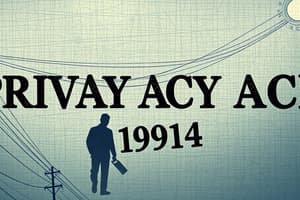Podcast
Questions and Answers
What is the main purpose of the Privacy Act of 1974?
What is the main purpose of the Privacy Act of 1974?
- To abolish the use of Social Security numbers
- To regulate the use of personal records by federal agencies (correct)
- To restrict public access to government information
- To limit the types of information collected by federal agencies
Who enforces the Privacy Act of 1974?
Who enforces the Privacy Act of 1974?
- Central Intelligence Agency (CIA)
- Federal Bureau of Investigation (FBI)
- Department of Homeland Security (DHS)
- Office of Management and Budget (OMB) (correct)
What does the Privacy Act define as a 'system of records'?
What does the Privacy Act define as a 'system of records'?
- Records used for congressional inquiries
- A group of records with sensitive information
- Records that are publicly available
- A group of records from which information is retrieved by an individual's name or identifier (correct)
What type of disclosures does the Privacy Act allow within an agency?
What type of disclosures does the Privacy Act allow within an agency?
When can personal information be disclosed without an individual's consent under the Privacy Act?
When can personal information be disclosed without an individual's consent under the Privacy Act?
Which government entity issues guidelines for agencies to implement the provisions of the Privacy Act?
Which government entity issues guidelines for agencies to implement the provisions of the Privacy Act?
What must federal agencies maintain a record of under the Privacy Act?
What must federal agencies maintain a record of under the Privacy Act?
Which right do individuals have under the Privacy Act concerning correction of their personal information?
Which right do individuals have under the Privacy Act concerning correction of their personal information?
What criticism has the Privacy Act faced regarding data uses for research and public health?
What criticism has the Privacy Act faced regarding data uses for research and public health?
Which statement best describes the legal protections provided by the Privacy Act?
Which statement best describes the legal protections provided by the Privacy Act?
What is a key concern raised about the Privacy Act's data protection laws regarding big data projects?
What is a key concern raised about the Privacy Act's data protection laws regarding big data projects?
What is emphasized as crucial for the effectiveness of the Privacy Act in an increasingly data-driven world?
What is emphasized as crucial for the effectiveness of the Privacy Act in an increasingly data-driven world?
Flashcards are hidden until you start studying
Study Notes
Privacy Act of 1974
Overview
The Privacy Act of 1974, enacted on January 3, 1975, is a federal law that sets rules for the collection, maintenance, dissemination, and destruction of personal records by federal agencies. The act is enforced by the Office of Management and Budget (OMB), which issues guidelines and regulations for the use of agencies in implementing the provisions of the act. The Privacy Act has undergone numerous supplements and expansions over the years, adapting to changes in information governance, such as the E-Government Act of 2002 and the Federal Information Security Modernization Act of 2014.
Components
The Privacy Act consists of several key provisions:
-
System of Records: The act defines a "system of records" as a group of records under the control of an agency from which information is retrieved by the name of the individual or by some unique identifier assigned to the individual, such as a Social Security number.
-
Routine Use and Intra-agency Disclosures: The act allows disclosures of personal information within an agency for a purpose consistent with the context in which the data was collected.
-
Consent and Congressional Inquiries: The act requires an individual's consent for disclosure of their personal information, unless the disclosure is pursuant to a court order or is otherwise required by law.
-
Accounting of Disclosures: Federal agencies must maintain a record of certain disclosures of personal information, including the name of the individual to whom the information is disclosed and the purpose of the disclosure.
-
Amendment Appeals: Individuals have the right to request correction of their personal information and to appeal any denial of their request.
-
Rights of Parents and Legal Guardians: The act provides rights to parents and legal guardians regarding the education records of their children.
Legal Protections
The Privacy Act provides legal protections to safeguard against various forms of harm, such as identity theft and invasion of privacy. It also allows for certain data uses that promote public benefits, including advancing knowledge and science, promoting public health, facilitating law enforcement, and enabling economic activity.
Criticism and Concerns
Despite its intentions, the Privacy Act has faced criticism for not aligning with public preferences and impeding public health and research. Some argue that the act does not provide specific exceptions for data uses for research or public health, which can lead to inconsistencies in data governance. Additionally, the act's patchwork of inconsistent data protection laws can create challenges for big data projects that require data from multiple sources.
Conclusion
The Privacy Act of 1974 is a significant piece of legislation that has undergone several updates over the years to adapt to changes in information governance. While the act aims to protect individual privacy, it has also faced criticism for not aligning with public preferences and for impeding public health and research. Continuous evaluation and updates to the act will be crucial to ensure its effectiveness in an increasingly data-driven world.
Studying That Suits You
Use AI to generate personalized quizzes and flashcards to suit your learning preferences.




